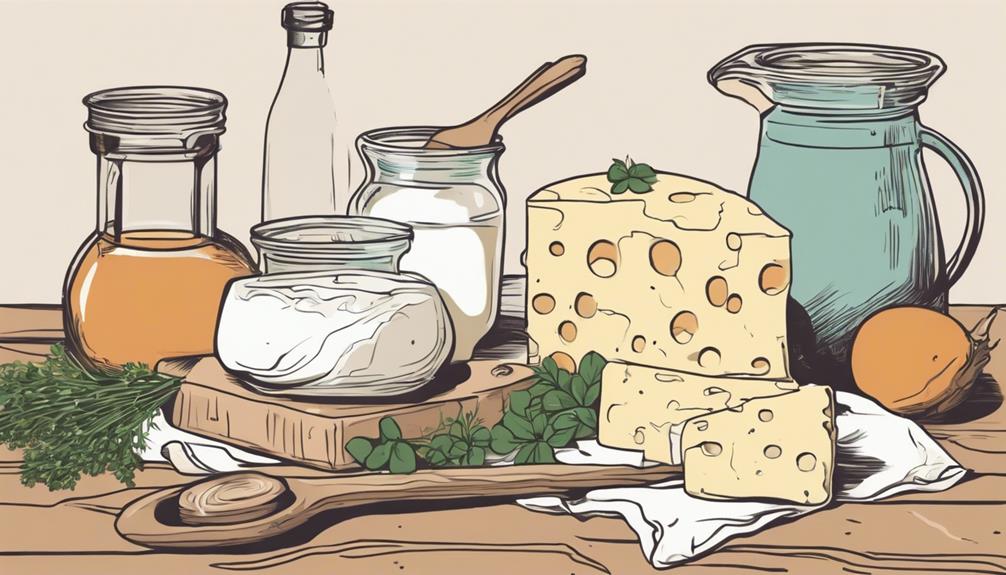How To Become More Self-Sufficient Without Starting a Full-Blown Farm…
Want to start preserving your harvest, making your own soap, or building a backyard root cellar — but not sure where to begin? “Homesteading Advice” gives you instant lifetime access to 35+ practical homesteading books on food preservation, veggie gardening, DIY natural cleaning products (save over $250 per year with this skill alone), brewing, off-grid energy, and a whole lot more…
Click Here To Check It Out Now!
Hey, I’m trying my hand at making cheese for the first time, and I’m using fresh milk from a local farm. I tried to make a simple cheese, but my milk didn’t coagulate properly. I followed the recipe to the letter, but instead of forming a nice curd, I’m left with a gooey, runny mess. Could you help me understand why this might have happened? Thanks in advance! – Bradley, Austin, USA.
Why Didn’t My Milk Coagulate Properly?
Hi Bradley, thanks for reaching out with your cheese-making conundrum! There can be a few different reasons why the milk didn’t coagulate as you expected. Let’s walk through the most common issues and how to troubleshoot them!
Milk Quality
The quality of your milk plays a significant role in how well it will coagulate. Fresh milk, especially from a local farm, can be wonderful, but its composition can vary.
- Pasteurization: If the milk has been ultra-pasteurized, it can inhibit proper coagulation. Ultra-pasteurization heats the milk to a higher temperature, denaturing proteins that are crucial for forming curds.
- Raw Milk: While raw milk can make excellent cheese, its variability means some batches may not coagulate well due to different levels of fats and proteins.
- Quality Control: Ensure the milk hasn’t been contaminated or is too old. Freshness is key here, Bradley!
Rennet Issues
Rennet is an enzyme that helps milk proteins to clump together, forming curds. If there’s a problem with your rennet, your milk won’t coagulate properly.
- Strength: Double-check the potency of your rennet. Expired or improperly stored rennet can lose its effectiveness.
- Mixing: Make sure the rennet is mixed thoroughly with the milk. Uneven distribution can lead to inconsistent coagulation.
- Type: There are various types of rennet (animal-based, vegetable-based, microbial). Ensure you’re using the correct type for your cheese recipe.
Acidity Levels
The acidity of the milk affects the coagulation process. If the pH level isn’t right, the milk won’t form curds properly.
- Starter Cultures: These help develop the acidity in your milk. Make sure your starter culture is active and added at the right time.
- pH Testing: Consider using pH strips or a pH meter to ensure your milk is in the right range, typically around pH 6.5 before adding rennet.
Temperature Control
The temperature at which you coagulate the milk is crucial. Too cold or too hot, and the enzyme action won’t proceed as planned.
- Heating: Ensure you’re heating the milk to the correct temperature specified in your recipe. Most cheese recipes require milk to be heated between 85-105°F (29-40°C) before adding rennet.
- Consistency: Maintain a consistent temperature throughout the coagulation process. Using a water bath can help maintain an even heat.
Time Management
Coagulation takes time, and sometimes it’s a case of being a bit too impatient.
- Setting Time: The typical setting time for rennet is between 45 minutes to 2 hours, depending on the recipe. Leave the milk undisturbed during this period.
- Observation: Check for a clean break by gently inserting a knife and lifting it. If the milk splits cleanly, it’s ready. If it’s still liquid or only semi-firm, give it more time.
Cleanliness and Sanitization
Undesirable bacteria or residue can interfere with coagulation. Make sure all your tools and containers are thoroughly sanitized.
- Equipment: Use food-grade sanitizers to clean your utensils and containers before starting.
- Environment: Work in a clean kitchen to minimize contamination.
Mineral Imbalance
Minerals in the water supply, like calcium, can affect the coagulation process.
- Calcium Chloride: Especially useful if using pasteurized or store-bought milk, a small amount can help restore balance and improve coagulation.
Common Mistakes and Quick Fixes
Let’s address a few more quick pointers to help Bradley get those curds setting perfectly next time.
- Double-Checking Measurements: Always measure out rennet and starter cultures accurately.
- Mixing Methods: Stir milk gently but thoroughly after adding ingredients to ensure even distribution.
- Alternative Milk Sources: Try using a different batch of milk or another supplier if problems persist. Sometimes, a new milk source can make all the difference.
Final Thoughts…
Bradley, thanks so much for your question! Remember, cheese making is an art that requires patience and attentiveness to details. By ensuring quality milk, precise temperatures, proper acidity, and clean equipment, you’ll be well on your way to making delicious cheese. Keep experimenting, and don’t be discouraged by a few bumps along the way. You got this!

